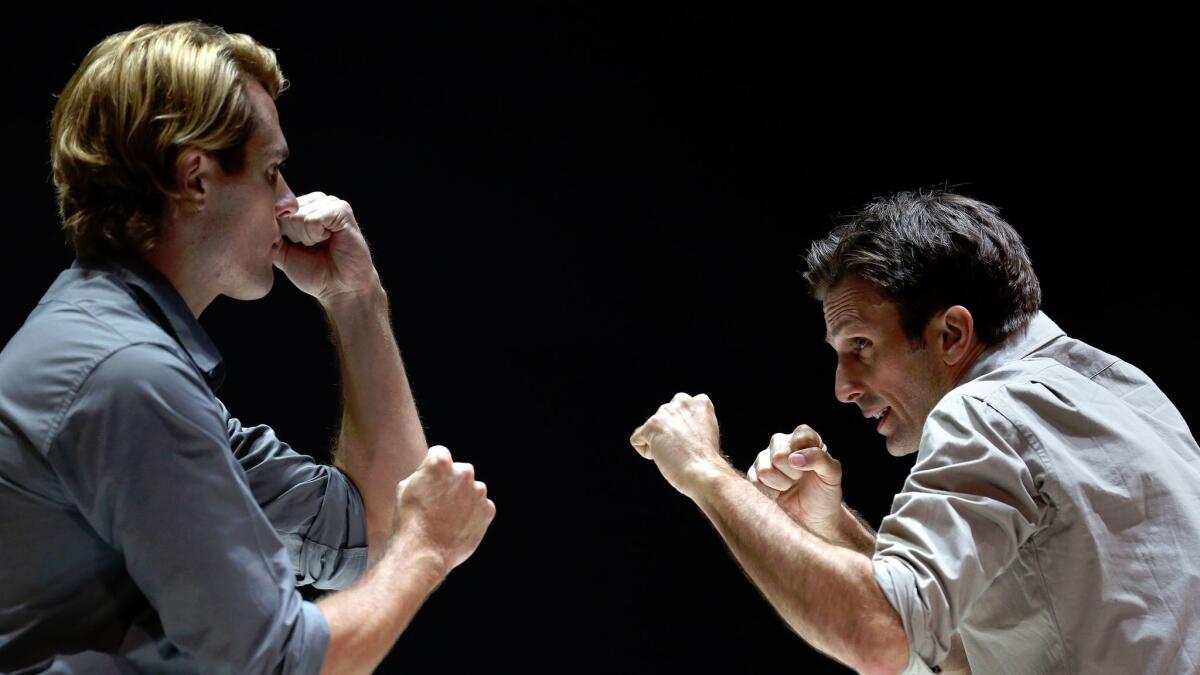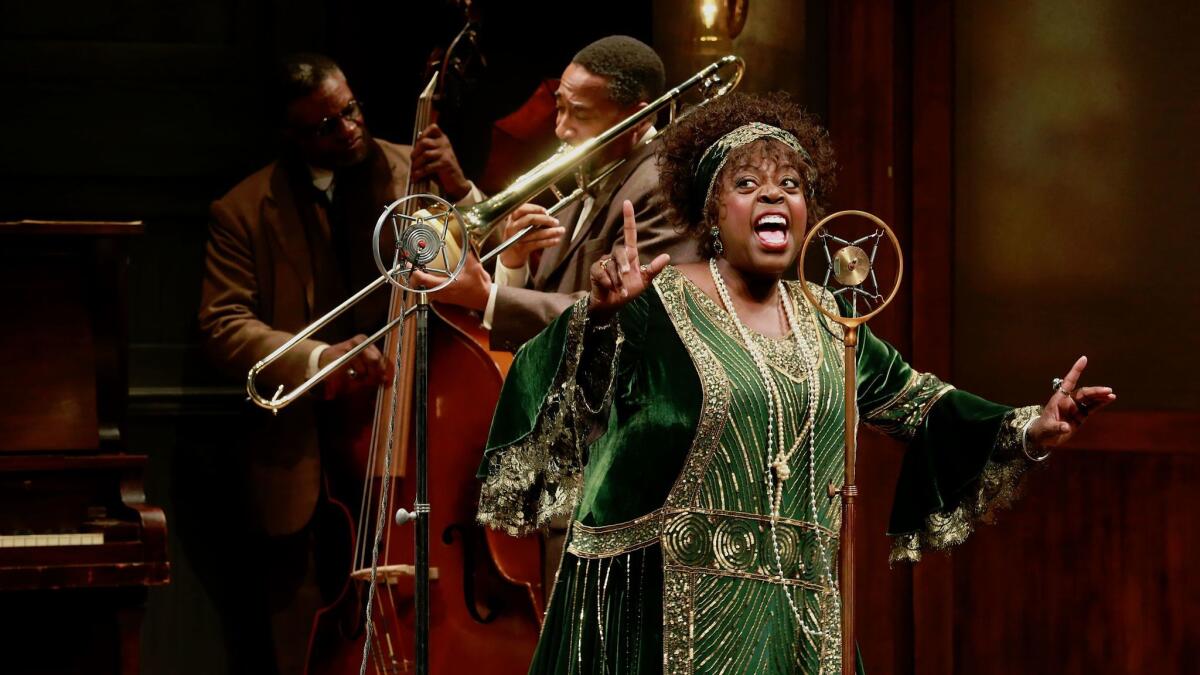Best theater of 2016: A strong showing for women in an otherwise challenging year
- Share via
In a year in which a woman won the popular vote and almost became president of the United States (I’m doing glass half-full here), female theater artists galvanized our stages. The producing landscape is still far from a level playing field, and the fight for equality undeniably suffered quite a few setbacks during the ugly election season, but all the more reason then to celebrate these theatrical triumphs.
Suzan-Lori Parks’ “Father Comes Home From the Wars, Parts 1, 2 & 3” (nimbly directed by Jo Bonney), Karen Zacarías’ “Destiny of Desire” and Bess Wohl’s “Barcelona” found new sources of vitality in American history, the telenovela and that old standby, the one-night-stand, respectively. Phylicia Rashad’s sensitive revival of August Wilson’s “Ma Rainey’s Black Bottom” turned the play’s monologues into blues riffs on race in America. Kathleen Marshall’s staging of “Love’s Labor’s Lost” transformed Shakespeare’s comedy into a frolicsome dance that was as modern as it was Elizabethan.
An alternative highlight reel of female talent could easily be put together. Playwright Lynn Nottage illuminated the rising anger and racial tensions of working-class Americans left behind by globalization in the exceptionally timely (and now Broadway-bound) “Sweat,” directed by Kate Whoriskey at New York’s Public Theater. Brazilian artist Christiane Jatahy examined through a modern lens August Strindberg’s classic “Miss Julie” in the hypnotic multimedia original performance work “Julia” at REDCAT. Playwright Julia Cho, on a tear with two wise and stylistically distinctive new plays, gave us the slow cooking “Aubergine” (a moving meditation on food, family and mortality) at Berkeley Repertory Theatre and “Office Hour” (starring a top-form Sandra Oh in this tense, highly compact drama about race, identity and gun violence) at South Coast Repertory.
Finally, in what may be the most impressive feat of acting in 2016, Harriet Walter portrayed Brutus in “Julius Caesar,” the title role in “Henry IV” and Prospero in “The Tempest” in the Donmar Warehouse’s all-female Shakespeare trilogy. This London bill, directed with fluid imagination by Phyllida Lloyd, made the equal opportunity case for performing classical roles more eloquently than any editorial could.
Here are some of the most memorable moments of my theatergoing year:
“Barcelona,” Geffen Playhouse. In this beautifully observed two-hander by Wohl, Betty Gilpin and Carlos Leal (under the crack direction of Trip Cullman) played strangers in the night who have to surmount differences of language and culture after a drunken pick-up leads to a menacing and ultimately mournful confrontation with their true identities.
“Casa Valentina,” Pasadena Playhouse. Harvey Fierstein’s comedy-drama, set in the 1960s at a fictionalized version of the historic transvestite Shangri-La in the Catskill Mountains, found the ideal director in David Lee to tease out not just the glamorous wigs but the play’s deeply felt sexual politics.
“Disgraced,” Mark Taper Forum, and “Junk: The Golden Age of Debt,” La Jolla Playhouse. A fiery production of Ayad Akhtar’s Pulitzer Prize-winning debate drama about Muslim identity in the post-Sept. 11 era and the world premiere of his play about the earthquake of junk-bond financing in the 1980s that prepared the way for the more recent economic collapse left no doubt that Akhtar is one of the most talented, intelligent and public-minded dramatists of his generation.

“A View From the Bridge,” Ahmanson Theatre. How welcome it was to experience Belgian auteur Ivo van Hove’s laser aesthetic at the Ahmanson in this modern operatic take on Arthur Miller’s combustible drama.
“Destiny of Desire,” South Coast Repertory. Director José Luis Valenzuela magnificently animated Zacarías’ ebullient homage to the telenovela in a play that delights in its own outrageous plotting while zanily offering up nuggets of wide-ranging wisdom from the narrative joyride.
“Endgame,” Kirk Douglas Theatre. Beckettian veterans Barry McGovern and Alan Mandell (who also directed) brought all their eloquent expertise to Samuel Beckett’s absurdist masterpiece in what was the best staging of the play I’ve seen.
“Father Comes Home From the Wars, Parts 1, 2 & 3,” Mark Taper Forum. Composing jazz in theatrical poetry, Parks explored the subject of freedom in its personal, historical and philosophical dimensions in this Civil War odyssey of a slave named Hero who’s on a quest for emancipation.
“Love’s Labor’s Lost,” Old Globe Theatre. Marshall’s graceful outdoor staging of Shakespeare’s most Elizabethan comedy infused a summer night with ecstatically choreographed romantic bliss, no matter that the wooing gentlemen (as the title suggests) are deprived of their victory at the end.

“Ma Rainey’s Black Bottom,” Mark Taper Forum. A fine ensemble cast, directed with supple musicality by Rashad, rebirthed the play that catapulted Wilson to national prominence.
“Safe at Home: An Evening With Orson Bean,” Pacific Resident Theatre. A master raconteur with inexhaustible wit and unerring comic timing, Bean captivated his audience with tales from the difficult childhood that led to a career in showbiz that he’s still happily improvising today. (Millennials have nothing on this spry octogenarian: A video of the show can be seen on YouTube.)
Bonus: “Shuffle Along, or the Making of the Musical Sensation of 1921 and All That Followed,” Broadway’s Music Box Theatre. In a year in which “Hamilton” once again eclipsed all other musicals, it would be a shame if George C. Wolfe’s reworking of this African American Broadway landmark got lost in the shuffle. The production, though shorter-lived than anticipated, was a marvel of virtuoso showmanship and revealed tap dancing to be one of Audra McDonald’s lesser-known superpowers.
SIGN UP for the free Essential Arts & Culture newsletter »
Follow me @charlesmcnulty
More to Read
The biggest entertainment stories
Get our big stories about Hollywood, film, television, music, arts, culture and more right in your inbox as soon as they publish.
You may occasionally receive promotional content from the Los Angeles Times.










